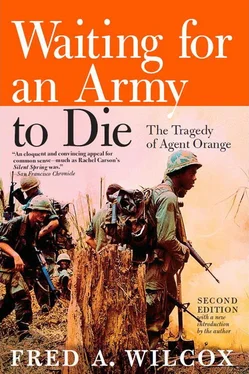Naples mentions the difficulty he has had in acquiring records to substantiate his argument that he was exposed to herbicides while serving in Vietnam. To secure service-connected disability he needs records that appear to be nonexistent. “They have the records from the time I left Colorado, California, and beginning again when I returned to the Brooklyn Navy Yard. But the three years in Vietnam are totally gone. And I’m not the only Nam vet who has had this problem. We just can’t get those records.”
Sutton stands beside the dining room table, working to control his anger. “Supposedly, under the Freedom of Information Act we should be allowed to get those records, but they tell you the old familiar theme that the records were destroyed in a fire in St. Louis, Missouri. But even Dow’s attorney, Leonard Rivkin himself, said that was a very minimal fire and the records are not missing. I mean, where else are you going to find a guy in his early thirties dying from not just one, but two, three, four blasts of cancer? And some of these cancers are inoperable. Why did the VA destroy all the cancer registry numbers of all the Vietnam veterans? Why was that? Do they have something to hide? You’re goddamn right they do!”
The tabby cat appears to be deep in thought or perhaps meditating on the vicissitudes and (because he has lived more than a decade) the pleasures of a long life. I have missed the four o’clock train to Brooklyn and wonder whether or not my car will still be there when I return. The sky is turning subway gray, with patches of blue and pink graffiti here and there.
“Ask not what your country can do for you, but what you can do for your country,” Sutton says flatly. “Yeah, I listened to that bullshit when I was about seventeen years old. Oh, you remember. It sunk in. My father was in World War II, and my father-in-law was a prisoner of war, and Joe’s father fought in World War II also. I guess we wanted to be just like daddy. I think this is more than a disgrace. We didn’t disgrace this nation, and I think it’s disgusting that our policymakers are doing this to a segment of society that did nothing more than answer the call to arms when it was asked.”
Mrs. Naples, who until now has whispered quiet encouragement to her husband, is suddenly angry. “There is constant clicking on our phone, like a tape rewind. And an echo, and Joe here, he’s seen government cars taking pictures of our house with telescopic lenses.”
“I’ve had the hang-ups,” Joe confirms, “got cut off mid-sentence. I won’t say who or why. I know who, and I hope you get it in the book and they get a gander at it. It seems like ever since this thing has started to build and I got involved in it, all this other craziness has started to happen, the tapping of the phone, the pictures from government cars, and all this other nonsense.”
Sutton’s wife returns from work with two bags of cat food and a stack of Xeroxed copies of a recent article about the discovery of a government memorandum that says Agent Blue, used for rice-crop destruction in Vietnam, had been clinically shown to be a human carcinogen. [4] “U.S. Cover-Up in Defoliant Suite Charged,” Newsday , February 18, 1982.
The memo’s author, the date it was sent, and the person to whom it was written have been masked out, and Leonard Rivkin, attorney for Dow Chemical, is quoted as accusing the government of engaging in a “cover-up” on the Agent Orange issue. Sutton scrutinizes the article for a moment and then, ushering Joe Naples and me to the door, announces: “I got news for those bastards. It’s just a matter of time. We’re gonna win this thing. We ain’t gonna wait forever. We’re gonna win it either on their terms or on ours, and you can just take that any way you want. We’re sick, we’re dying, and they keep on playing games with our fucking lives. That just can’t go on forever.”
Naples offers me a ride to the station, and on the way he talks about his two sons, one of whom was born with webbed toes and suffers from sleep disturbances, seizures, learning disabilities, hyperactivity, and brain damage. “He’s only seven years old,” Naples says, “and wears coke-bottle glasses, has an abnormal EEG, and wakes in the night screaming. His mom and me, we’ll go in the room and we can’t stop him; he just keeps it up. And when he does wake up if we ask him what was wrong he’ll say, ‘I dunno.’ He’ll be doing something, like writing with his pen, and he’ll put it down, go over to get a drink, and forget what he did with the pen. His concentration just blows. He can’t keep his mind on anything. We took him down for an EEG and the doctor said, ‘This boy’s got many, many problems.’ And yet there’s nothing in my family or my wife’s family about anyone having psychiatric problems or anything like this. Our oldest boy stopped breathin’ when my wife brought him home, and she brought him back with mouth-to-mouth resuscitation. He was in the hospital in oxygen for a month, then we brought him home and within an hour he stopped breathin’ again, and the second time he had to be in oxygen for three months. You know, we suffered from this stuff they sprayed in Nam, and it’s bad, and now our kids are gonna suffer from it, and God only knows, how far down the line this stuff gonna carry through?
“Not long ago my oldest boy was askin’ about the war. He wants to hear about it. But there’s only so much I can tell him. And one time he said, ‘If I get called, I’m not goin’!’ So I says, ‘If you get called, you’ll go, I’ll see to it.’ But just recently he asked again and we got talkin’ and I said, if they don’t settle this thing I’ll be the first to take you to Canada. I’ll lock and load it if I have to. But I’m not gonna let what happened to me happen to my son.”
Driving home from the hospital, Sandy and Jerry Strait are exceptionally happy. The sky is blue and cloudless, and the grass sparkles from an early morning rain. Adjusting the tiny bundle on her lap so that she can see her daughter’s sleeping face, Sandy taps her foot in time with the song on the radio. Just five more minutes and they will be home, so they have to make a decision. Before they can turn off the car’s engine, their four-year-old will be tugging at the door, demanding to hold her new “sissy.” She will want to carry her seven-pound, six-ounce sibling across the living room to her rocking chair and rock “our baby” to sleep. After a brief discussion the Straits agree that no harm can result from allowing Heather to play mother. After all, just seventy-two hours earlier an obstetrician had called their new daughter “a perfect, beautiful baby.”
Glancing at her husband, Sandy notices that he has regained the twenty pounds he lost shortly before she learned she was pregnant. How much better things are now than four years ago when Heather was born. Jerry had been back from Vietnam only a year; they were living in a cramped house and had little money and no hospital insurance. When their daughter was only nine weeks old, Sandy had been forced to return to work, but this time, she tells friends and relatives, things will be different. She will be there when her baby utters her first words or takes her first wobbly steps. Having decided that this will be their last child, Sandy just wants to coddle, pamper, even spoil her baby for as long as she can. Pulling into the drive the Straits laugh. Clad in a pink sunsuit Heather races across the yard, her arms held high and her hands spread-eagled.
July and August pass quickly, giving way to a luxurious Indian summer that ends, as Midwestern falls often do, in a sudden, vicious blizzard. Heather can hardly wait for Christmas, demanding to know if her little sister will be talking or walking by then, and if she will want to see Santa Claus or watch the elves making toys in the window of a downtown department store. On Christmas day Sandy’s mother arrives with presents and, while her daughter prepares dinner, she goes into the living room to tend to her new grandchild. But as she watches her granddaughter exercise, Sandy’s mother notices something peculiar. Reaching into the crib she lifts first Lori’s right foot, then her left. The left heel of her pajamas is frayed, nearly worn through, while the right is perfectly intact. “Have you noticed,” she asks her daughter later that evening, “that Lori favors her left leg and hardly moves her right?”
Читать дальше











